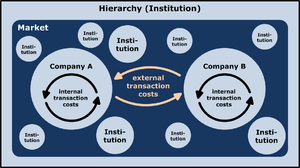Transaction cost
Appearance
(Redirected from Transaction-cost economics)

- Max Boisot, 1998
A transaction cost in economics is a cost incurred in making an economic exchange of some sort, or in other words the cost of participating in a market.
| This economics-related article is a stub. You can help out with Wikiquote by expanding it! |
Quotes
[edit]- Quotes are arranged alphabetically by author
A - F
[edit]- Following the lead given by new institutional economics, we shall take the transaction as our unit of analysis. For our purposes, a transaction can be thought of as any act of social exchange that depends on information flows for its accomplishment. Transactions can be as simple and brief as the purchase of a packet of cigarettes, or as complex as and extended as those which bind a Zen master to his disciples. Like institutional economists, we are interested in the relationship that can be established between different transactional characteristics and the phenomenon of institutionalization. Our use of the term transaction, however, will extend beyond that of institutional economics where the focus has tended to be primarily on transaction costs and efficiency considerations. These, to be sure, are relevant. But, as we shall see, they are not the whole story.
- Max Boisot, Knowledge Assets: Securing Competitive Advantage in the Information Economy: Securing Competitive Advantage in the Information Economy. Oxford University Press, 1998. p. 124; As cited in: Ortiz et al. (2006)
- Markets are institutions that exist to facilitate exchange, that is, they exist in order to reduce the cost of carrying out exchange transactions. In an economic theory which assumes that transaction costs are nonexistent. markets have no function to perform, and it seems perfectly reasonable to develop the theory of exchange by an elaborate analysis of individuals exchanging nuts for apples on the edge of the forest or some similar fanciful example. This analysis certainly shows why there is a gain from trade, but it fails to deal with the factors which determine how much trade there is or what goods are traded.
- Ronald Coase The Firm, the Market and the Law (1988)
- These individual actions are really trans-actions instead of either individual behavior or the "exchange" of commodities. It is this shift from commodities and individuals to transactions and working rules of collective action that marks the transition from the classical and hedonic schools to the institutional schools of economic thinking. The shift is a change in the ultimate unit of economic investigation. The classic and hedonic economists, with their communistic and anarchistic offshoots, founded their theories on the relation of man to nature, but institutionalism is a relation of man to man. The smallest unit of the classic economists was a commodity produced by labor. The smallest unit of the hedonic economists was the same or similar commodity enjoyed by ultimate consumers. One was the objective side, the other the subjective side, of the same relation between the individual and the forces of nature. The outcome, in either case, was the materialistic metaphor of an automatic equilibrium, analogous to the waves of the ocean, but personified as "seeking their level." But the smallest unit of the institutional economists is a unit of activity -- a transaction, with its participants. Transactions intervene between the labor of the classic economists and the pleasures of the hedonic economists,simply because it is society that controls access to the forces of nature, and transactions are, not the "exchange of commodities," but the alienation and acquisition, between individuals, of the rights of property and liberty created by society, which must therefore be negotiated between the parties concerned before labor can produce, or consumers can consume, or commodities be physically exchanged.
- John R. Commons, "Institutional Economics", American Economic Review, Vol.21, pp.648-657, 1931
- A large part of what we think of as economic activity is designed to accomplish what high transaction costs would otherwise prevent or to reduce transaction costs so that individuals can negotiate freely and we can take advantage of that diffused knowledge of which Friedrich Hayek has told us.
- Ronald Coase, Nobel Memorial Prize Lecture, "The Institutional Structure of Production", in Essays on Economics and Economists (1994), p. 9
- In general terms, transactions costs are the costs that arise when individuals exchange ownership rights to economic assets and enforce their exclusive rights. A clear definition of transactions costs does not exist, but neither are the costs of production in the neoclassical model well defined.
- Tráinn Eggertsson (1990), Economic behavior and institutions: p. 14

